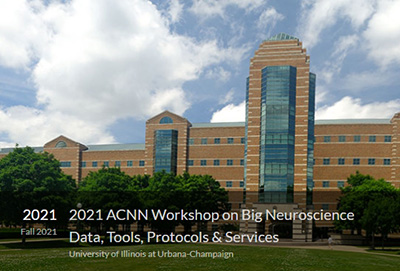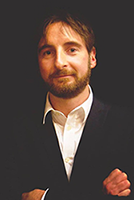By Erica Joo

Researchers working at the interface of computational neuroscience, big data science, and health analytics held the latest in a series of workshops designed to virtually bring together their community to explore new research and opportunities. The 2021 Advanced Computational Neuroscience Network (ACNN) meeting was held September 2–3, 2021. This is the sixth year that this workshop series was organized since the initial seed funding from the Midwest Big Data Innovation Hub in 2016. Despite this being the second year that the COVID-19 pandemic has led to this being an online meeting, participation remained strong, with over 180 participants from over 40 institutions across the Midwest, USA, and several other countries.

“The success of this workshop series in bringing together researchers across the Midwest has gone beyond our initial expectations,” said co-organizer and ACNN co-founder Franco Pestilli. “Every year for the last six years we have had students, postdocs, and faculty join the events. There is a thirst for connection across the Midwest.”
“This is how I have come to think about the Midwest region: It is similar to Boston or New York City but with a geographical barrier,” Pestilli said. “Large hubs such as those in the East Coast have an incredible amount of talent compressed within a small urban area. That allows researchers to share scientific ideas, results, and resources just by walking into a building at the other side of town. The Midwest has similar talent but spread across an incredibly large geographic region. What our workshop series aimed at doing is to break the barriers to scientific research and education created by the geography of the Midwest region. We did so first by using support by the NSF to bring students and scientists together from across the Midwest.”
“We learned a lot by going virtual,” Pestilli continued. “In 2020, we had over 450 participants, and double that of the years before. This year’s event was hybrid and we learned that it is possible to successfully bring together talent across the Midwest using hybrid events. We think that if more of these events are organized, the data science and neuroscience talents across large U.S. regions can come together more often, and effectively, just like it can more naturally happen in the East Coast hubs. We can break the geographical barriers to science and education in the Midwest. We also think that the southern States possibly have a similar challenge, with talent dispersed across a large geographic area. I am looking forward to expanding our Neuroscience network to the South.”
The 2021 meeting included multiple research presentation sessions, lightning talks, and keynote talks. Dr. Kamil Ugurbil from the University of Minnesota delivered the “Nalbandov Public Lecture” on Harnessing Imaging towards meeting a Central Scientific Challenge of the 21st Century: Understanding Human Brain Function. And Charles Springer from the Oregon Health and Science University presented a keynote lecture on Celebrating the 50th anniversary of first human MRI for non-invasive 3D imaging of water molecules, or protons, bones and soft tissues.
Reports of some exciting new research included recent work of Monica Rosenberg from the University of Chicago on building generalizable models of human behavior using Big Data neuroimaging data, and Archana Venkataraman from Johns Hopkins University, who demonstrated novel strategies for understanding structural and functional brain connectivity and its applications to multidimensional clinical phenotyping.
“The ACNN workshop was fantastic,” said Rosenberg. “It was a great way to hear about cutting-edge theoretical and methodological work in the field and connect with the computational and network neuroscience communities here in the Midwest. I’d love to participate in the future.”
A number of talks and lightning presentations introduced powerful multimodal techniques for data-driven inference in structural, functional, and diffusion imaging (Shella Keilholz), contrasting population-based and individual differences in functional brain networks (Caterina Gratton), and deriving and utilizing proxy measures of brain connectivity (Joaquin Goni). One lightning talk held by Dr. Bradly Alicea from the University of Illinois at Urbana-Champaign was on network science and application to neuroscience and biology. One such presenter, Paul Camacho, who is a neuroscience doctoral student at the University of Illinois at Urbana-Champaign, shared his experience from the workshop.
“The workshop was a fantastic event with a rare balance of world-class keynote speakers and a well-curated set of lightning talks from our Midwest community,” said Camacho. “The level of discussion in each session was greater than I had come to expect from virtual conferences over the past couple of years. Although I did not personally know all of my fellow presenters, there was a sense of camaraderie that is emblematic of the Midwest and very appreciated in the scientific community. As a mark of how successful the workshop was in fostering collaboration, I have noticed an uptick in traffic to the GitHub repositories for the work I presented in my lightning talk.”
Dr. Bradly Alicea from the University of Illinois at Urbana-Champaign held a lightning talk on his research in the application of network science on neuroscience and biology. “The conference went well. I’ve attended other conferences before, and there were some great keynote speakers as well as interesting discussions at this one,” Alicea notes. “I’m looking forward to next year’s conference and hope to present again.”
Next year, the 2022 ACNN meeting is scheduled to be held in person in Texas. “After five tremendous years in the Midwest I relocated to the South, to the University of Texas at Austin,” said Franco Pestilli. “I am currently in the process of exporting the model for the Big Data Neuroscience workshops to the South, building a new team of collaborators across the Southern states. I am sure the Midwest team, Ivo Dinov, Rich Gonzalez, and the others, will continue the work we have initiated in the region. The Midwest Big Data Hub has been fundamental in supporting our activities and I am sure it has interests at stake to continue the ‘good’ that it has been started and to connect the human infrastructure resources the Midwest has available.”
Get involved
Contact the Midwest Big Data Innovation Hub if you’re aware of other people or projects we should profile here, or to participate in any of our community-led Priority Areas.
The Midwest Big Data Innovation Hub is an NSF-funded partnership of the University of Illinois at Urbana-Champaign, Indiana University, Iowa State University, the University of Michigan, the University of Minnesota, and the University of North Dakota, and is focused on developing collaborations in the 12-state Midwest region. Learn more about the national NSF Big Data Hubs community.
